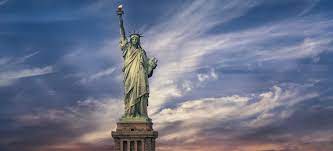Forbidding freedom of movement to aspiring migrants strikes at the liberty not only of those individuals but also of citizens and legal residents of the United States. That’s the way it is with immigration. Indeed, that’s the way it is with freedom. The government can’t violate the freedom of some peaceful people without also violating the freedom of others.
Ilya Somin, who teaches law at George Mason University and is a constitutional scholar with the Cato Institute, makes this point in “Three Constitutional Issues Libertarians Should Make Their Own.” (The other two issues his title refers to are zoning and racial profiling.) Somin also wrote the book Free to Move: Foot Voting, Migration, and Political Freedom.
“Immigration restrictions,” he writes, “massively restrict liberty and degrade human welfare. By barring entry to hundreds of thousands of people who seek freedom and opportunity in the United States, the federal government massively restricts the liberty of would‐be immigrants and American citizens alike.”
The harm to aspiring migrants is obvious. People seeking to escape crushing poverty and/or oppression are denied the freedom to move to a safer and more productive place. They are condemned to deprivation, misery, and pain at the hands of the government and gangs. (The U.S. war on drug makers and merchants in Latin America is the big reason for this.) By what right are they condemned? “Legal” immigration is more of a theoretical fiction than a real thing. Somin writes:
In theory, they can join the “line” and wait to enter legally. But for most, that line is either decades‐long or nonexistent. And for the most part, these exclusions are based on arbitrary circumstances of parentage and place of birth, of a kind libertarians and others in the liberal political tradition consistently reject in other contexts.
He goes on: “Less widely appreciated, even by many libertarians, is the massive negative effect of immigration restrictions on the liberty of current American citizens.” We don’t usually think of immigration this way. (Political philosopher Chandran Kukathas does.) But every person represents an American’s opportunity for gains from trade, friendship, and more intimate relationships, all the things that promote flourishing. Immigration controls control Americans too. As Somin writes:
Immigration restrictions bar millions of Americans from engaging in economic and social transactions with potential immigrants. It closes off Americans from hiring immigrant workers, getting jobs at businesses founded by immigrants (who establish such enterprises at higher rates than native-born citizens), renting property to immigrants, and benefiting from scientific and economic innovations to which immigrants also contribute at higher rates than natives.
Those who lament the government-made mess at the border have never understood that constructive responses to the new potential employees, buyers, tenants, etc. would privately and spontaneously arise if border crossing was legal.
Somin adds that “No other current U.S. government policy restricts liberty more than immigration exclusion does—and that’s true even if we focus solely on the liberty of native‐born citizens, especially economic freedoms.”
The prevention of gains from trade has profound and negative consequences for the production of wealth. Somin: “Economists estimate that free migration throughout the world would double global domestic product. That’s an enormous chunk of lost wealth for immigrants and native‐born citizens alike.”
Think of the abundance of goods, the new things, and the low prices that we’re all missing out on! (See Bryan Caplan’s Open Borders for details.)
Somin also sees constitutional problems with the restrictions that he laments has been neglected by even most libertarian legal scholars (including himself), not to mention others, such as conservatives, who claim to be staunch constitutionalists. “It’s far from clear,” he writes, “that the original meaning of the Constitution even gives the federal government a general power to restrict immigration in the first place.”
Nothing in the text specifically grants Congress or the president such authority, and leading Founding Fathers—including James Madison—argued that no such power existed. It took more than a century for the Supreme Court to rule—in the 1889 Chinese Exclusion Case—that the federal government does in fact have this unenumerated power. And that decision is based on highly dubious reasoning and tinged with racism.
Somin does not foresee an imminent overturning of the ruling, but he would like to see assaults on “extensions of that ruling that have largely immunized immigration restrictions from constitutional constraints that apply to virtually every type of government policy.” For example:
Immigration detention and deportation proceed with far weaker due process protections than other severe deprivations of liberty. Due process is so lacking in the system that Immigration and Customs Enforcement and other agencies have detained and sometimes even deported thousands of American citizens before they figured out their error. Such detention with little or no due process would not be tolerated elsewhere.
But do “illegal” immigrants have rights supposedly protected by the Constitution? Somin replies: “A few constitutional rights are explicitly confined to U.S. citizens. But the vast majority are phrased as general constraints on government power, and protect citizens and noncitizens alike.” Thus, “[t]he exemption of immigration restrictions from many normal constitutional constraints on government power has no basis in the text or original meaning of the Constitution.”
So he wants an end to the many double standards. That “would curtail many of the worst abuses of the current migration regime, and perhaps set the stage for further progress. Even incremental improvement could make the difference between freedom and oppression for many thousands of people.”
Hear, hear!








